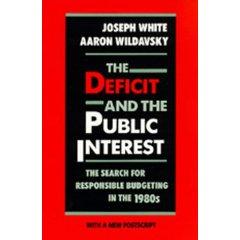| 2020ok Directory of FREE Online Books and FREE eBooks |
Free eBooks > Nonfiction > Politics > General > The Deficit And The Public Interest: The Search For Responsible Budgeting In The 1980s
The Deficit And The Public Interest: The Search For Responsible Budgeting In The 1980sby Joseph White And Aaron Wildavsky  Download Book (Respecting the intellectual property of others is utmost important to us, we make every effort to make sure we only link to legitimate sites, such as those sites owned by authors and publishers. If you have any questions about these links, please contact us.) link 1 About Book Future Survey "Wildavsky is the leading US scholar on the budgetary process. This bipartisan effort by a liberal (White) and a conservative (Wildavsky) deserves attention." Norman J. Ornstein, New York Times Book Review "The Deficit and the Public Interest should be required reading for anyone who has followed the deficit debate. . . . To read it fully takes some discipline, and some basic knowledge of legislative procedures and jargon. Fortunately, the writing style is felicitous, lively and clear. That, along with both the careful, honest, straightforward marshalling of argument and data and the power of the thesis, makes the effort worthwhile." Book Description Political time is counted, not in years, but in issues--the depression defined the political era of the 1930s just as the cold war did the 1950s and civil rights the 1960s. Today the federal budget looms as the dominant issue by which all others are considered and has become a concern which catalyzes debate again and again in our nation's capital. In this definitive new work, Joseph White and Aaron Wildavsky describe and analyze the struggles over taxing and spending from Carter's last year through the Reagan administration. The battle of the budget is largely about how we define the role of the government and its relationship to the people. It is a story of congressional horsetrading, partisan posturing, and technical tricks that affect billions of dollars. It is also a story of politicians operating within constraints set by both public opinion and political interpretation of economic reality. Though budgeting has always been important, its impact on the national agenda has grown dramatically in the last decades. Based on extensive interviews with participants and thorough use of documentary sources, this book both explains how budgeting works so the reader can see what is at stake in seemingly arcane disputes and locates budgeting within larger ideological trends in American society. It also explains the relationship of the budget to media, party and policy activists and explores the ways in which the deficit represents a crisis of self-confidence in the ability of our institutions, preeminently Congress and the presidency. Along the way, it provides a uniquely comprehensive account of the entire budget problem, exploring Gramm-Rudman, tax reform, and the continuing stalemate around this issue. The Deficit and the Public Interest offers a wide-ranging "solution" to the deficit that encompasses several ideas: the authors demonstrate that institutions have performed better than their members and critics believe, and they contend that extreme solutions would likely be much worse than the original problems. Further, they redefine the problem as one of reducing interest costs so the deficit becomes manageable, and they proffer political advice on how to make this approach politically acceptable, both at home and abroad. This meticulously researched work provides an invaluable journey through the last decade of American politics. In its theoretical depth and incisive new approach to policymaking, The Deficit and the Public Interest lends a fundamentally new understanding of the place of the federal government in American society. From the Inside Flap "No one can understand the politics of the 1980s without understanding the politics of the budget, and no one understands the politics of the budget better than White and Wildavsky. In explaining why budgeting has dominated national politics, they show the implications for American government of the long stalemate over the deficit."--Allen Schick, University of Maryland From the Back Cover "No one can understand the politics of the 1980s without understanding the politics of the budget, and no one understands the politics of the budget better than White and Wildavsky. In explaining why budgeting has dominated national politics, they show the implications for American government of the long stalemate over the deficit." (Allen Schick, University of Maryland) About the Author Joseph White is a Research Associate in the Governmental Studies Program at the Brookings Institute. Aaron Wildavsky is Professor of Political Science at the University of California, Berkeley. Related Free eBooks
| Related Tags |












SEND A COMMENT
PLEASE READ: All comments must be approved before appearing in the thread; time and space constraints prevent all comments from appearing. We will only approve comments that are directly related to the article, use appropriate language and are not attacking the comments of others.